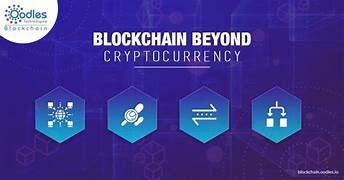The Blockchain Revolution: Possibilities Beyond Cryptocurrency
Blockchain technology, often synonymous with cryptocurrencies like Bitcoin and Ethereum, is a transformative innovation reshaping industries far beyond the confines of digital finance. As a decentralized, transparent, and immutable ledger system, blockchain offers endless possibilities for improving processes, enhancing security, and enabling new business models. This article delves into the diverse applications of blockchain technology beyond cryptocurrency, exploring its potential to revolutionize sectors such as healthcare, supply chain management, real estate, and more.
Understanding Blockchain Technology
At its core, blockchain is a distributed ledger that records transactions across multiple computers. Unlike traditional databases, it operates without a central authority, making it resistant to tampering and fraud. Each “block” contains a list of transactions, and these blocks are linked together in a “chain” through cryptographic hashes. This design ensures data integrity and transparency, as every transaction is visible and verifiable by participants within the network.
Blockchain in Healthcare
One of the most promising applications of blockchain lies in the healthcare industry. Patient data management is a significant challenge, with sensitive information often stored across disconnected systems. Blockchain can address this issue by providing a unified, secure platform for storing and sharing medical records.
For example, a blockchain-based system allows patients to control access to their medical histories while ensuring that healthcare providers have accurate and up-to-date information. This reduces errors, improves care coordination, and enhances patient privacy. Furthermore, blockchain can streamline clinical trials by ensuring data integrity, facilitating secure sharing of research findings, and tracking the supply chain of pharmaceuticals to prevent counterfeit drugs.
Revolutionizing Supply Chain Management
The supply chain industry is plagued by inefficiencies, lack of transparency, and counterfeiting. Blockchain offers a solution by providing an immutable record of every transaction, from the source of raw materials to the final consumer. This level of traceability helps businesses ensure product authenticity, comply with regulations, and build consumer trust.
For instance, companies like IBM and Walmart are leveraging blockchain to track food products. By recording every step of the journey—from farm to table—blockchain enables rapid identification of contamination sources, reducing foodborne illnesses and waste. Additionally, this technology is being used in the fashion and luxury goods industries to authenticate products and combat counterfeits.
Enhancing Real Estate Transactions
Real estate transactions are notoriously complex, involving multiple intermediaries, extensive documentation, and significant time delays. Blockchain simplifies this process by digitizing property records and enabling secure, direct peer-to-peer transactions.
Smart contracts, self-executing agreements with terms written into code, are a key feature of blockchain in real estate. These contracts automatically enforce agreements once conditions are met, reducing the need for intermediaries like escrow services. By eliminating inefficiencies and increasing transparency, blockchain can make buying and selling property faster, cheaper, and more secure.
Blockchain in Education
In education, blockchain can revolutionize the way academic credentials are issued, verified, and stored. Traditional methods of credential verification are time-consuming and prone to fraud. With blockchain, educational institutions can issue digital certificates that are tamper-proof and easily verifiable.
This application not only streamlines the hiring process for employers but also empowers students to maintain a lifelong record of their achievements. Additionally, blockchain can facilitate secure sharing of research data among academics, fostering collaboration and innovation.
Transforming Voting Systems
Blockchain has the potential to address longstanding issues in voting systems, such as fraud, low voter turnout, and lack of transparency. By enabling secure and transparent digital voting, blockchain can ensure the integrity of elections while making it easier for citizens to participate.
Each vote recorded on a blockchain is immutable and verifiable, eliminating concerns about tampering. Furthermore, blockchain-based voting systems can provide real-time results and enhance voter confidence by offering unprecedented levels of transparency.
Financial Services Beyond Cryptocurrency
While blockchain is best known for enabling cryptocurrencies, its impact on traditional financial services is equally significant. Blockchain can streamline processes such as cross-border payments, trade finance, and insurance claims.
For example, blockchain enables faster and cheaper cross-border transactions by eliminating the need for intermediaries. In trade finance, it simplifies the exchange of documents and reduces fraud by creating a secure and transparent ledger. Insurance companies can use blockchain to automate claims processing through smart contracts, improving efficiency and customer satisfaction.
Energy Sector Innovations
The energy sector is exploring blockchain for managing energy distribution, trading renewable energy credits, and enabling peer-to-peer energy trading. Blockchain allows households with solar panels to sell excess energy directly to their neighbors, bypassing traditional utility companies.
Platforms like Power Ledger are already demonstrating the feasibility of such systems, promoting sustainable energy practices and empowering consumers. Additionally, blockchain can enhance the tracking of renewable energy credits, ensuring accountability and compliance with environmental regulations.
Overcoming Challenges
Despite its potential, blockchain technology faces several challenges that must be addressed for widespread adoption. Scalability remains a significant issue, as many blockchain networks struggle to handle large transaction volumes efficiently. Energy consumption is another concern, particularly for proof-of-work (PoW) blockchains like Bitcoin.
Regulatory uncertainty also poses a hurdle, as governments worldwide grapple with how to classify and regulate blockchain-based systems. Interoperability between different blockchain platforms is another area that requires development to enable seamless integration across industries.
The Road Ahead
As blockchain technology continues to evolve, its applications will expand, driving innovation and efficiency across various sectors. Emerging technologies such as artificial intelligence (AI) and the Internet of Things (IoT) are expected to integrate with blockchain, creating new possibilities for data sharing, automation, and security.
For instance, combining IoT devices with blockchain can enhance supply chain transparency, enable predictive maintenance in manufacturing, and improve healthcare outcomes through real-time monitoring of patient data. Similarly, AI can leverage blockchain’s secure data storage to develop more accurate and reliable models.
Conclusion
The blockchain revolution extends far beyond cryptocurrencies, offering transformative solutions for industries ranging from healthcare and supply chain management to education and energy. By enhancing transparency, security, and efficiency, blockchain has the potential to reshape the way we conduct business, interact with technology, and manage information.
However, realizing this potential requires addressing challenges such as scalability, energy consumption, and regulatory hurdles. As these issues are resolved, blockchain will undoubtedly become a cornerstone of the digital economy, unlocking new opportunities and redefining the boundaries of innovation.


